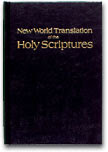If you were walking in a jail and you saw this torture, what would you do? If you inquired as to what the person was being tortured for and the torturer said, "Because he didn't believe in the judge who could sentence him to this torture," honestly, what would you think about this judge? If you inquired further and the man said, "Well, a while back he got a parking violation that he didn't pay off. He was fined a fair amount and then after he paid the fine we decided to torture him for the next forty years." Wouldn't that be unjust?
Imagine that judge is God. The jailer torturing the man is Jesus Christ. The man being tortured is a man who has just died. Let us say this traffic violator was a doctor who saved countless lives, gave much to those in need, even adopted two children from poor countries, and showed himself to be a good husband, father, friend, brother. In short, he was always helping others. However, this man was not "saved by grace". Is he deserving of being tortured in hell for all eternity? Absolutely not. If "God is love" as the Scriptures say and "perfect is his activity" (Deuteronomy 32:4) then would He be a kind, merciful God if He tortured this man for all eternity because he wasn't "saved by grace?"
Furthermore, torturing people with fire was something that God never even considered. Speaking of people who would burn their children in fire as sacrifices to God, Jeremiah 7:31 says of the practice that this was something that God "had not commanded and that had not come up into [his] heart." Yes, God had never even considered the thought of people being tortured with fire, much less forever.
Even the idea that the soul lives on after death is something completely foreign to the Bible. In fact it says simply, "The soul that sins--it itself will die." (Ezekiel 18:4) At Ecclesiastes 9:5 the Bible says, "For the living are conscious that they will die; but as for the dead, they are conscious of nothing at all!"
The soul dies? The dead are conscious of nothing at all? If people did go to hell after they died then that would completely contradict those verses. Then where does the doctrine of hell come from? From mistranslations of the Bible! There is no hell in the sense that people who claim to be Christians teach. The concepts of hell in the Bible were completely different from what Jesus and the apostles thought of as hell. Plus, ask yourself, is it really a just punishment to torture people for all eternity for something they did for just seventy or eighty years of their life? Let your morality be the judge. If our morality says "no" then God, who is perfect and loving, would likewise say no, right?
Then what is the punishment for sins? Romans 6:23 tells us: "For the wages sin pays is death." Yes, we pay for our sins upon death. James 1:14, 15 says, "Each one is tried by being drawn out and enticed by his own desire. Then the desire, when it becomes fertile, gives birth to sin; in turn, sin, when it has been accomplished, brings forth death." So we die because we sin, and yet Romans 6:7 says, "For he who has died has been acquitted ["acquitted", NWT and HCSB, footnote; KJV, NIV, and others say "freed"] from his sin." We have paid off our "debt" of sin by dying. Do you torture someone for incurring a debt after they have paid it off? No. They are free to go after they have paid their debt.
What about those Scriptures that plainly speak of people tortured with fire for all eternity? Well, fire in the Bible is symbolic for destruction. So when the Bible says that someone is to be punished with eternal fire, it simply means eternal destruction. One case in point is found for us at Jude 7. "So too Sodom and Gomorrah and the cities about them...are placed before us as a warning example by undergoing the judicial punishment of everlasting fire." Are Sodom and Gomorrah actually burning today? No! In fact, they are most likely now underwater, their remains submerged in the Dead Sea! Sodom and Gomorrah are not burning forever, they are destroyed forever, never to be rebuilt.
What we really need to examine, though, is what the Bible says the final end for people will be. According to Peter, "But these men, like unreasoning animals born naturally to be caught and destroyed, will, in the things of which they are ignorant and speak abusively, even suffer destruction in their own course of destruction, wronging themselves as a reward for wrongdoing." (2 Peter 2:12-13) Peter tells us that wicked people will suffer destruction, not eternal torment. Another name for this everlasting destruction is "the second death". In fact, we are told that the second death is "the lake of fire." The lake of fire cannot be hell because "death and hell were cast into the lake of fire."-Revelation 20:14, King James Version
One last point worth consideration on this, fire equaling destruction, is what the Bible says will be the final end to Satan the Devil. We read, "And the Devil who was misleading them was hurled into the lake of fire and sulphur...and [he] will be tormented day and night forever and ever." (Revelation 20:10) However, Hebrews 2:14 says that Jesus will "destroy him." (King James Version) This falls right into place when we understand the true meaning of the lake of fire. Satan will be thrown into the Lake of Fire for ever. In other words, he will be dead, yes, destroyed, forever and ever.
What about such Scriptures as Mark 9:43-48? The New International Version has this as:
"If your hand causes you to sin, cut it off. It is better for you to enter life maimed than with two hands to go into hell, where the fire never goes out. If your foot causes you to sin, cut it off. It is better for you to enter life crippled than to have two feet and be thrown into hell. And if your eye causes you to sin, pluck it out. It is better for you to enter the kingdom of God with one eye than to have two eyes and be thrown into hell, where 'their worm does not die, and the fire is not quenched.'"
This is a quote of Isaiah 66:24. "And they will go out and look upon the dead bodies of those who rebelled against me; their worm will not die, nor will their fire be quenched, and they will be loathsome to all mankind." One commentary says that this Scripture is refers to going out "of Jerusalem to the surrounding Hinnom Valley (Gehenna), where human sacrifice was once practiced (Jeremiah 7:31) and which eventually became the city's refuse heap." [1] What is the verse speaking of? It is not talking about being tortured; it speaks of dead bodies. What is speaks of as not dying is worms--not human lives or immortal souls.
One Bible commentary commenting on Mark 9:48 says, "[The] phrase is taken from Isaiah 66:24. The prophet shows the two ways corpses were usually destroyed: putrefaction and incineration...The juxtaposition in the text of the maggots and fire reinforces the idea of destruction...Both destructive forces are described as permanent ('is not quenched, does not die'): there is simply no way to escape them. In this image, the only survivors are the maggot and the fire--not the man--and they both annihilate anything that falls within their power. Hence, this is not a description of everlasting torment, but one of total destruction." [2] Obviously, the doctrine of eternal torment is debunked from four different angles: 1) Bible Commentators, 2) Moral Reasoning, 3) Understanding the Person of God, 4) Using the Bible Itself. There is no punishment after death for the wicked.
So, is death the end, since it is unconsciousness? No. Acts 24:15 says, "I have a hope toward God, which these men themselves also entertain, that there is going to be a resurrection of the righteous and the unrighteous." (See also John 5:28, 29; Revelation 20:12, 13) Almost everyone who has ever lived will have the opportunity to live again in a perfected earth without Satan, sin, and wickedness to get in the way of coming to Jehovah God.
References
[1] The Jerome Biblical Commentary
[2] El evangelio de Marcos. Analisis linguistico y comentario exegetico, (The Gospel of Mark. Linguistic Analysis and Exegesis Commentary), Vol. 2

























